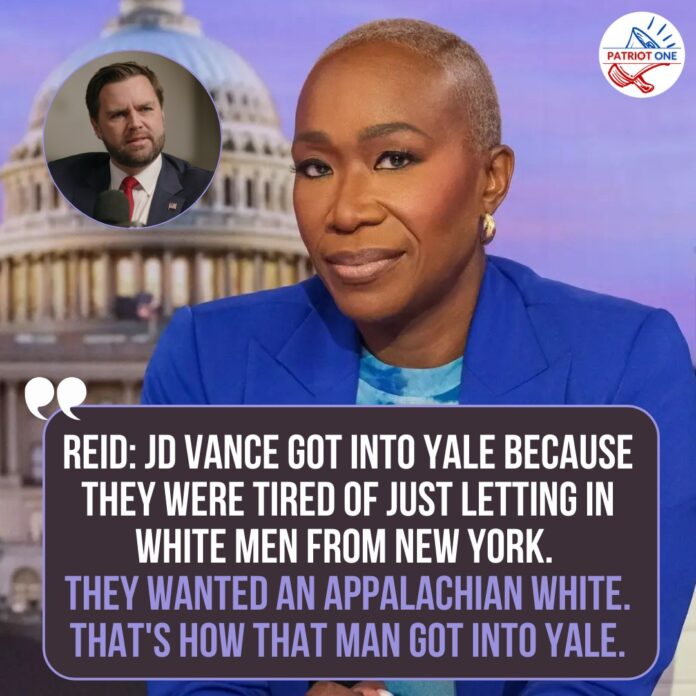MSNBC host Joy Reid has stirred up controversy after making a bold statement about Senator JD Vance’s educational background. During a recent segment, Reid argued that Vance’s acceptance into Yale Law School wasn’t just about merit, but also about his value to the school as a symbol of geographic and socioeconomic diversity.

“JD Vance got into Yale because they were tired of just letting in white men from New York… from all the elite schools. They wanted an Appalachian white,” Reid said. “That’s how that man got into Yale, I promise you… That’s also affirmative action and DEI.”
Her comments quickly went viral, reigniting national debate about affirmative action, diversity, equity, and inclusion (DEI), especially in elite academic institutions.
JD Vance, now a U.S. Senator from Ohio, rose to national prominence after publishing his memoir Hillbilly Elegy, in which he described growing up in a working-class Appalachian family and eventually making it to Yale Law School. His story has often been framed as a classic American success narrative: grit, hardship, and perseverance.
But Reid’s argument flips the framing. According to her, Vance wasn’t simply an outsider who beat the odds—he was the odds the school was looking for.
“They wanted someone from coal country,” Reid continued. “That kind of background was rare at Yale. He checked a box. That’s what DEI looks like in practice, whether people want to admit it or not.”
Critics quickly accused Reid of hypocrisy, saying she was applying a double standard—calling it DEI when it suits a political narrative, but rejecting it when it benefits minorities. Conservative pundits argued that Reid was undermining the accomplishments of someone who came from poverty just because he’s white and male.
Supporters, however, said Reid was pointing out a broader truth: elite institutions don’t just pursue racial diversity—they also want socioeconomic and geographic variety. And sometimes, a white man from rural Ohio can be just as much of an outlier as a Black or Latino student from an inner city.
The debate comes at a time when affirmative action is under fire nationally. In 2023, the Supreme Court struck down race-conscious admissions policies at Harvard and UNC, effectively ending race-based affirmative action in higher education. Since then, conservatives have pushed to roll back DEI programs in universities, government, and corporate America.
Reid’s remarks challenge the narrative that only racial minorities benefit from diversity policies. By framing Vance’s Yale admission as a form of “Appalachian affirmative action,” she forces a broader conversation: Who really benefits from diversity efforts? And are some forms of DEI more “acceptable” than others?
As expected, Senator Vance has not publicly responded to Reid’s comments. But the moment has already added fuel to the ongoing culture wars over education, identity, and meritocracy in America.
One thing is clear: DEI isn’t just about race—and Reid’s comments have ensured that uncomfortable conversations about privilege, opportunity, and perception aren’t going away anytime soon.
